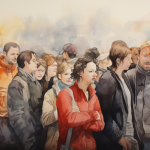What Does It Mean to Dream About Agoraphobia?
Understanding the meaning behind dreams of fear and confinement
Dreaming about agoraphobia can be a distressing experience. If you’ve woken up from a dream where you felt trapped, isolated, or terrified of open spaces or crowds, you might be wondering what your subconscious is trying to tell you. Are these dreams linked to your waking fears? Or do they carry a deeper symbolic meaning about your emotional state?
Agoraphobia, a fear of places or situations that might cause panic or helplessness, is a powerful theme when it appears in dreams. These dreams often highlight feelings of vulnerability, anxiety, or a desire for safety. In this blog post, we will explore what dreaming about agoraphobia means, why such dreams occur, and how you can interpret them to better understand yourself.
What Is Agoraphobia and Why Does It Appear in Dreams?
Agoraphobia is an anxiety disorder characterised by an intense fear of being in situations where escape might be difficult or help unavailable. In dreams, agoraphobia often symbolises more than just a literal fear of crowds or open spaces—it can represent emotional or psychological barriers, feelings of being overwhelmed, or a sense of powerlessness.
Dreams about agoraphobia commonly arise during stressful times or periods of significant change when your mind is processing fear and uncertainty. They may also reveal a subconscious desire to regain control or to avoid situations that feel threatening in real life.
Common Themes in Dreams About Agoraphobia
1. Feeling Trapped or Unable to Escape
Many agoraphobia-related dreams involve a sensation of being trapped, whether in a confined space or a public area. This can symbolise feeling stuck in a difficult situation in your waking life, such as a relationship, job, or emotional state you find hard to change.
These dreams may be urging you to explore what is holding you back and to consider ways to reclaim your freedom.
2. Fear of Crowds or Open Spaces
Dreaming of being overwhelmed by crowds or wide-open places often reflects anxiety about social situations or fear of exposure. It may indicate a desire to hide or protect yourself from judgement or overwhelm.
If you recognise this fear from your waking life, the dream may be a direct reflection of your agoraphobia symptoms. Otherwise, it might represent more general social anxiety or discomfort with vulnerability.
3. Avoidance and Isolation
Agoraphobia dreams can also show a tendency to avoid challenges or isolate yourself emotionally. The dream may highlight a part of you that feels safer shutting down or withdrawing, rather than facing difficult situations.
This avoidance can provide short-term relief but may also limit personal growth and happiness in the long run.
What Your Dream of Agoraphobia Might Be Telling You
Dreams about agoraphobia are often about recognising your fears and how they affect your life. Here are some possible messages your subconscious could be sending:
- Acknowledging Anxiety: Your dream may be inviting you to face anxiety instead of pushing it aside.
- Exploring Boundaries: It might encourage you to set healthy limits and protect your emotional wellbeing.
- Seeking Control: Dreams of fear and confinement often highlight a desire to regain control over your environment or feelings.
- Need for Support: The dream may suggest reaching out for help or building a support network to feel safer and more confident.
Understanding these messages can be the first step towards healing and reducing fear’s hold on your life.
How to Reflect on a Dream About Agoraphobia
If you’ve had a dream about agoraphobia, try these steps to uncover its meaning:
- Write Down the Details
Note the setting, your feelings, who else was present, and any actions you took in the dream. - Identify Your Emotions
Were you scared, panicked, calm, or resigned? Your emotional response can offer clues to the dream’s message. - Connect to Your Waking Life
Consider recent situations where you felt anxious, confined, or overwhelmed. Do you see any parallels? - Ask What You Need
Does the dream suggest you need more support, courage, or boundaries in your daily life?
Coping with Agoraphobia Dreams and Anxiety
If dreams about agoraphobia are frequent or upsetting, it’s important to take care of your mental health:
- Practice Relaxation Techniques: Breathing exercises, meditation, or progressive muscle relaxation can reduce anxiety.
- Challenge Negative Thoughts: Try to recognise and question fearful beliefs that fuel anxiety.
- Create a Safe Space: Both in dreams and reality, cultivating environments where you feel secure can ease fear.
- Seek Professional Support: Therapy, especially cognitive behavioural therapy (CBT), can be highly effective for agoraphobia and related anxiety.
Remember, you are not alone, and help is available.
When to Seek Help for Agoraphobia and Anxiety Dreams
Dreams about agoraphobia can signal underlying anxiety issues that may benefit from professional support. If you find yourself avoiding everyday activities, experiencing panic attacks, or feeling isolated, talking to a mental health professional can provide valuable strategies for managing fear and improving quality of life.
Final Thoughts: Embracing the Message of Your Agoraphobia Dream
Dreams about agoraphobia are complex but deeply meaningful. They shine a light on fears that affect your waking life and invite you to take steps towards healing and empowerment. While such dreams can feel frightening, they offer a chance to understand yourself better and build resilience.
By reflecting on these dreams with kindness and curiosity, you can begin to break free from the fears that hold you back and move towards greater confidence and peace.



